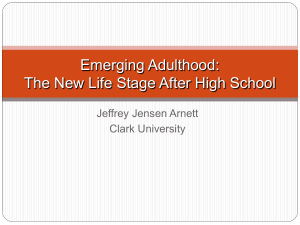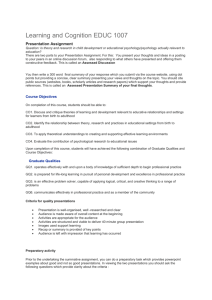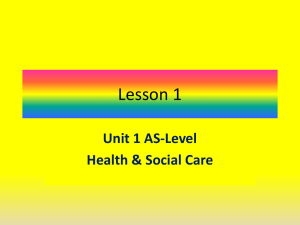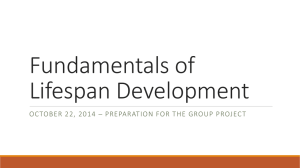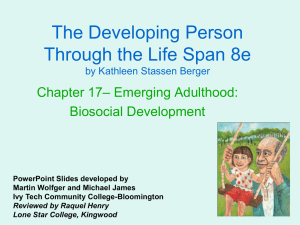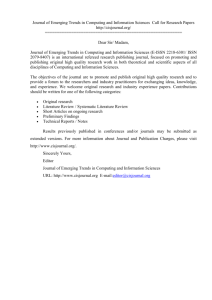Psyc 258 Emerging Adulthood: Development from the Late Teens
advertisement
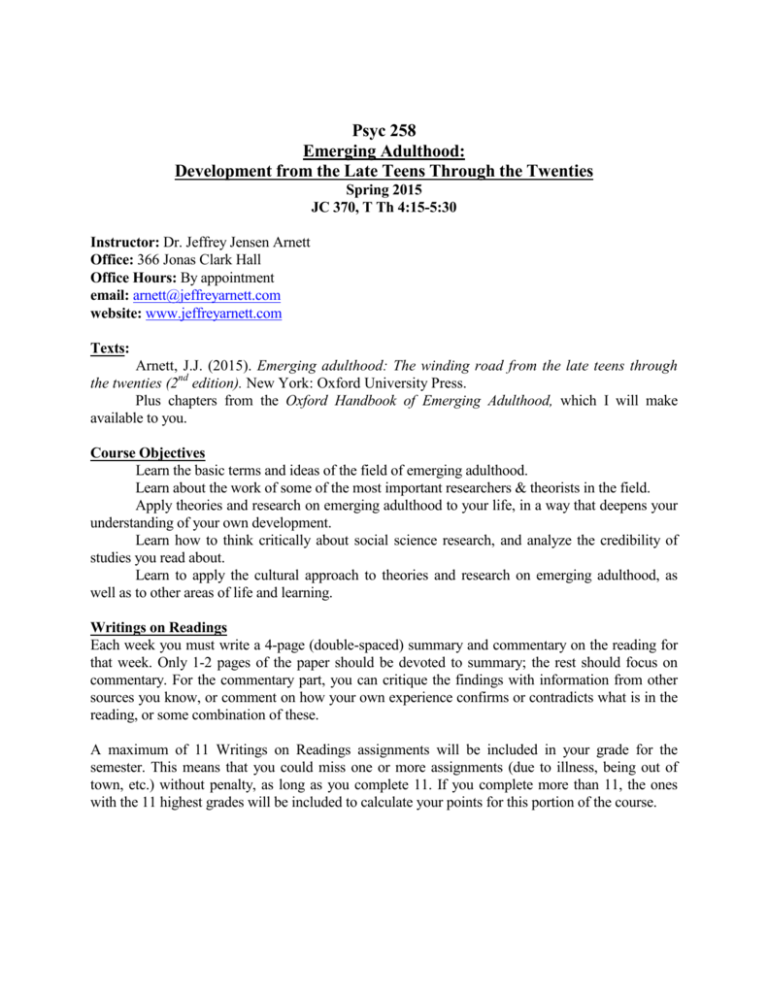
Psyc 258 Emerging Adulthood: Development from the Late Teens Through the Twenties Spring 2015 JC 370, T Th 4:15-5:30 Instructor: Dr. Jeffrey Jensen Arnett Office: 366 Jonas Clark Hall Office Hours: By appointment email: arnett@jeffreyarnett.com website: www.jeffreyarnett.com Texts: Arnett, J.J. (2015). Emerging adulthood: The winding road from the late teens through the twenties (2nd edition). New York: Oxford University Press. Plus chapters from the Oxford Handbook of Emerging Adulthood, which I will make available to you. Course Objectives Learn the basic terms and ideas of the field of emerging adulthood. Learn about the work of some of the most important researchers & theorists in the field. Apply theories and research on emerging adulthood to your life, in a way that deepens your understanding of your own development. Learn how to think critically about social science research, and analyze the credibility of studies you read about. Learn to apply the cultural approach to theories and research on emerging adulthood, as well as to other areas of life and learning. Writings on Readings Each week you must write a 4-page (double-spaced) summary and commentary on the reading for that week. Only 1-2 pages of the paper should be devoted to summary; the rest should focus on commentary. For the commentary part, you can critique the findings with information from other sources you know, or comment on how your own experience confirms or contradicts what is in the reading, or some combination of these. A maximum of 11 Writings on Readings assignments will be included in your grade for the semester. This means that you could miss one or more assignments (due to illness, being out of town, etc.) without penalty, as long as you complete 11. If you complete more than 11, the ones with the 11 highest grades will be included to calculate your points for this portion of the course. In-Class Presentations of Readings: This is a seminar course, and the essence of a seminar course is that each student contributes to the teaching of the course. Consequently, in this course each student will be required to provide 2 presentations of the assigned readings. We will do this weekly on a rotating basis, beginning the 3rd week of the semester. Each presenter should distribute a one-page summary of the reading at the beginning of class. Presentations should last 10-15 minutes and include an overview of the key points of the reading as well as some interesting questions or issues raised by the reading. To enhance your presentation, try to include a “creative element” that goes beyond the material in the reading. This could be any of a number of things, such as an essay you found on the Internet related to your topic, a research article you obtained that pertains to the topic of the reading, a video clip related to the topic, etc. Be creative! Exams: There will be a mid-term exam and a final exam. Exams will consist of essay questions and will be take-home. The final exam will not be cumulative. If you miss an exam for unavoidable reasons, you must notify the instructor within 48 hours of the exam or receive an F. You must have a documented excuse if you wish to make up the exam. Only excuses pertaining to student’s severe illness, death in the immediate family, or similar serious events will qualify. Term Paper Each student will pick a country and write a 15-page term paper on emerging adulthood in that country. More on this assignment is provided below. Each student will also make a 15-20 minute presentation in class about what life is like for emerging adults in their chosen country. Cultural Guests: In the course of the semester, we will invite persons to our class who can add a real-life and personal perspective on emerging adulthood in a different culture. I encourage student suggestions for whom to invite and for assistance in inviting these persons. Grading: Grading will be calculated as follows: Term Paper: 100 points In-class presentations: 3 x 15 = 45 points Mid-term exam: 100 points Final exam: 100 points Writings on Readings: 11 @ 5 points each = TOTAL: 55 points 400 points Grading Scale A+ = 389-400 points A = 368-388 points A- = 360-367 B+ = 352-359 B = 328-351 B- = 320-327 C+ = 312-319 C = 288-311 C- = 280-287 D+ = 272-279 D = 240-271 F = 239 or fewer points All grades are FINAL. There will be NO negotiations to move up to the next grade level. Class Schedule Week 1 (January 13 & 15) January 13, Introduction January 15, EA in Pop Culture --Bring a “cultural artifact” from popular culture that reflects the new life stage of emerging adulthood (i.e., song, advertisement, TV show clip, story, news article, etc.). I will have a laptop and projector set up, so if you would like to show something that way just bring the link or know how to find it. Your writing assignment for this week (due Th) will be 2 pages long, and will describe why you chose your artifact and how it represents American society’s view of EAs. Week 2 (January 20 & 22) Arnett (2015), Prefaces to 2nd & 1st editions, chapters 1-3 Week 3 (January 27 & 29) Arnett (2015), chapters 4-5 Week (February 3 & 5) Arnett (2015), chapter 6-7 Week 5 (February 10 & 12) Arnett (2015), chapters 8-10 Week 6 (February 17 & 19) Arnett (2015), chapters 11-13 Week 7 (February 24 & 26) MIDTERM EXAM (take-home), due February 27 by 5 pm, via email (arnett@jeffreyarnett.com) ** SPRING BREAK, March 2-6 ** Week 8 (March 10 & 12) OHEA chapters on generational perspectives, gender; term paper presentations Week 9 (March 17 & 19) OHEA chapters on race/ethnicity, aging out of foster care; term paper presentations Week 10 (March 24 & 26) OHEA chapters on brain development, social cognition; term paper presentations Week 11 (March 31 & April 2) OHEA chapters on sibling relationships, friendships; term paper presentations Week 12 (April 7 & 9) OHEA chapters on sexual orientation, television use; term paper presentations Week 13 (April 14 & 16) OHEA chapters on identity development, moral development; term paper presentations ** TERM PAPERS DUE ** Week 14 (April 21 & 23) OHEA chapters on political beliefs, homeless EAs; term paper presentations ** FINAL EXAM ** (take-home) Other Important Information Classroom Etiquette: Please remember to TURN OFF YOUR CELL PHONE before entering class. Individual Student Credit Points: I do not provide individual students with opportunities to complete additional assignments for extra credit points. This includes seniors whose class performance may call into question their ability to meet graduation requirements. Academic Honesty: Academic honesty is fundamental to the activities of a university. All members of the academic community must be confident that each person's work has been responsibly and honorably developed and presented. Any effort to gain an advantage not given to all students is dishonest whether or not the effort is successful. The academic community regards academic dishonesty as an extremely serious matter and students found guilty of such practices receive severe penalties. The University has specific academic dishonesty administrative procedures (see www.clarku.edu/offices/aac/integrity.cfm). It is your responsibility to be informed about the parameters of academic dishonesty. Claims of ignorance do not constitute a legitimate excuse. If a student is caught engaging in academically dishonest behavior, my policy is to give an F for the course. Students with Special Needs: If you have special needs as addressed by the Americans with Disabilities Act (ADA) and need assistance, please let me know. All reasonable efforts will be made to accommodate your needs. For information and resources, please see www.clarku.edu/offices/aac/ada/support.cfm Term Paper For this assignment you will write a 15-page research paper (not including references) on emerging adulthood on a country outside North America. Choose your country by Week 3 of the semester, and let me know what it is so that I can approve it and make sure no 2 students have chosen the same country. You are required to obtain at least 6 sources on emerging adulthood in your country. Those sources can be drawn from scholarly journals and books using Google Scholar (it’s easy to use, go to googlescholar.com, fill in your search terms [e.g., emerging adulthood Germany], and see what you can find). Articles and book chapters can usually be downloaded from Google Scholar, but you many need to order some through the Clark library, so it is important to get an early start. The 6 sources must not be “pop” sources (e.g., Internet blog posts, newspaper or magazine articles). A list of your sources must be provided at the end of your paper under the heading “References.” The reference list should be in “APA style.” If you do not know APA style, follow the models at the end of your Emerging Adulthood book. In the second half of the semester, each student will provide a 15-20-minute class presentation on emerging adulthood in his/her country. As part of this presentation, each student must distribute a one-page summary on emerging adulthood in his/her country. In addition, each student will distribute a map showing where the country is located. Paper Assignment: General points and information * Put the appropriate page number in the upper right-hand corner of each page. * Margins on your paper should be one-inch (no larger) on all sides. If margins are larger than one inch, paper may be lowered one grade. * Papers should be double-spaced throughout. If spacing is greater than normal double-spacing, paper may be judged to be too short and lowered one grade. * Papers should have a cover page, which should not be numbered and is not included in the length required for the assignment. The cover page should include a title, my name and the name of this course, your name, and the date you are handing the paper in. * Papers will be lowered one grade if they are more than a half a page short of the specified length. However, papers also should not be more than one-half page longer than the specified length. Papers which are too long by more than one-half page may also be lowered one grade. * Late papers will be lowered one grade for each day they are late (including week-end days), and will not be accepted more than one week past the due date. * Keep a copy of your paper in case one gets lost between you and me. Grading Scale for Paper Assignments EXCELLENT (100 points): All the specified goals of the assignment are fulfilled. Paper achieves excellence in organization, clarity, style, and quality of thought. Organization is well-planned and easy to follow, with an evident beginning, middle, and end. Sources have been well-chosen and are thoughtfully presented and nicely integrated. Thoughts in the paper are clearly expressed and clearly related to the thesis. Style is smooth, with well-formed sentences and well-developed, nicely connected paragraphs, and free of errors of grammar, spelling, and word use. GOOD (90 points): All specified goals of the assignment were addressed, with excellence in some but not all respects. Some aspects of the assignment may have been overlooked, or may not have been fulfilled adequately. Sources are generally good, but one or two may be weak or presentation of source material may have minor errors or deficiencies. Writing is clear and well-developed for the most part, but there may be minor problems of organization, clarity, or style. ACCEPTABLE (80 points): Paper has some strengths, but also some weaknesses. Some requirements of the assignment may be omitted or addressed insufficiently. Sources may be uneven in quality or presentation. Paper may also have serious problems of organization, clarity, or style. Main points are reasonably clear, but there may be parts of the paper that are not well-developed. Some ideas may be expressed well, but others are not expressed clearly. Paragraphs may be inadequately developed, or inadequately connected to one another. Paper may have errors of grammar, spelling, or word use. UNEVEN (70 points): Paper meets some requirements of the assignment, but contains a number of serious weaknesses. Writing may be unclear or poorly developed. Sources are generally weak or poorly presented and poorly integrated. Paper may "wander off," i.e., it may contain material that is not related to the main theme. There may some good ideas that are marred by inadequate organization, or awkward writing, or the ideas presented may be superficial or incompletely stated. Sentences and paragraphs may be poorly constructed. There may be other errors of grammar, spelling, punctuation, or word use. WEAK (60 points): Paper fails to meet most of the requirements of the assignment, although it may meet some. Sources have not been chosen well, or are presented in a sloppy or incoherent way. Content may fail to support main idea, or paper may be poorly written throughout. May lack clear beginning, middle, and end. Writing is often unclear or awkward or trite. May be simply a listing of the various points of the assignment, without any attempt to integrate them or develop them. May contain numerous errors of grammar, spelling, punctuation, and word use. UNACCEPTABLE (50 points or fewer): This paper clearly fails the requirements of the assignment. It may be obvious that it was written in haste or without thought or effort. Sources chosen are clearly inadequate. The paper is disorganized and sloppy, and it is difficult to read because of lack of clarity in the argument presented and in the construction of the sentences and paragraphs. It is unacceptable as college-level writing, because it is only vaguely related to the topic of the assignment, or because the paragraphs are constructed so poorly, or because there are so many errors of grammar, spelling, punctuation, and word use. UNREADABLE or TOO LATE or NOT SUBMITTED (0 points): Papers which cannot be read, for any reason, will be assigned this score. This includes papers that are turned in hand-written, and papers that have so many errors it is impossible to make sense of them.
